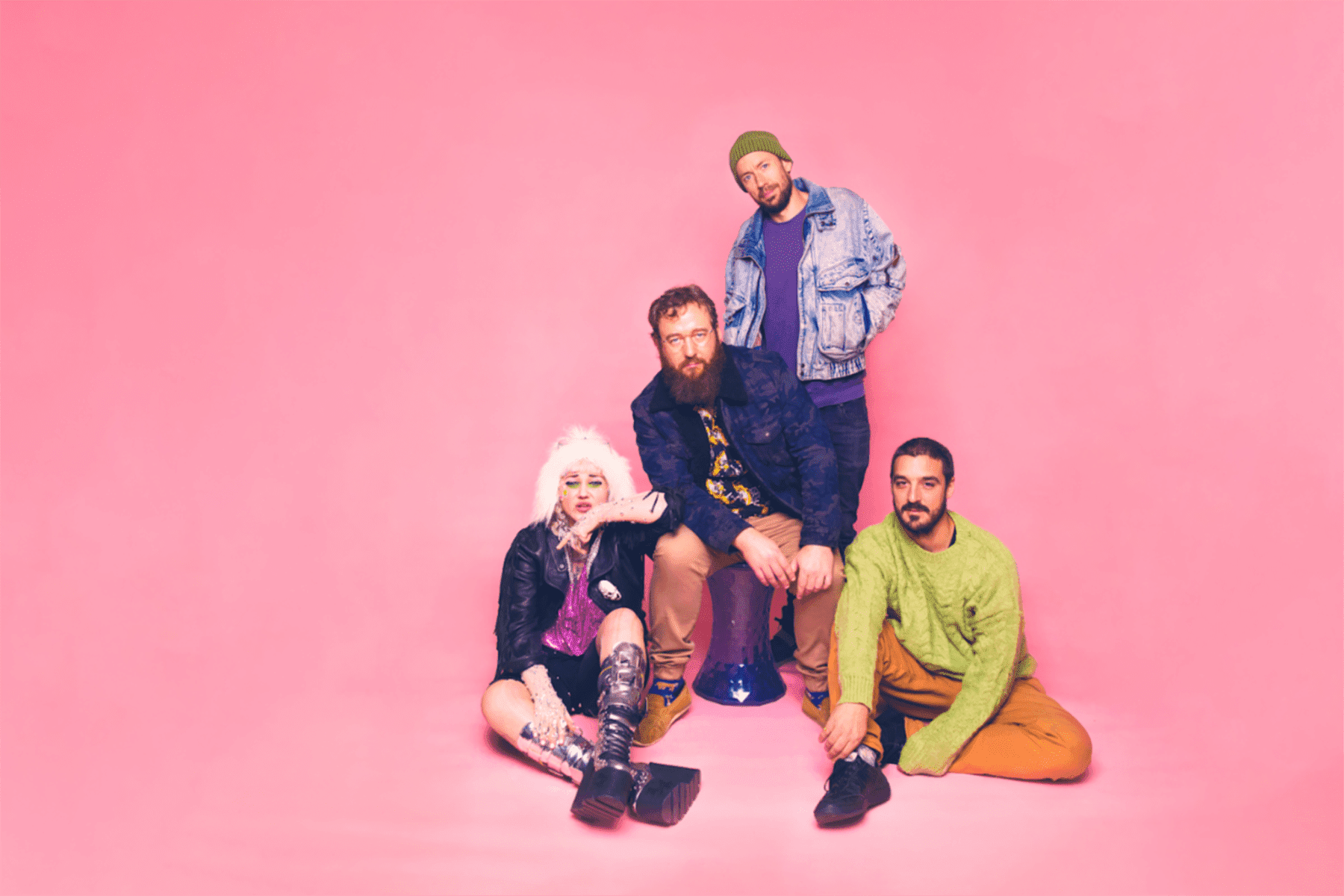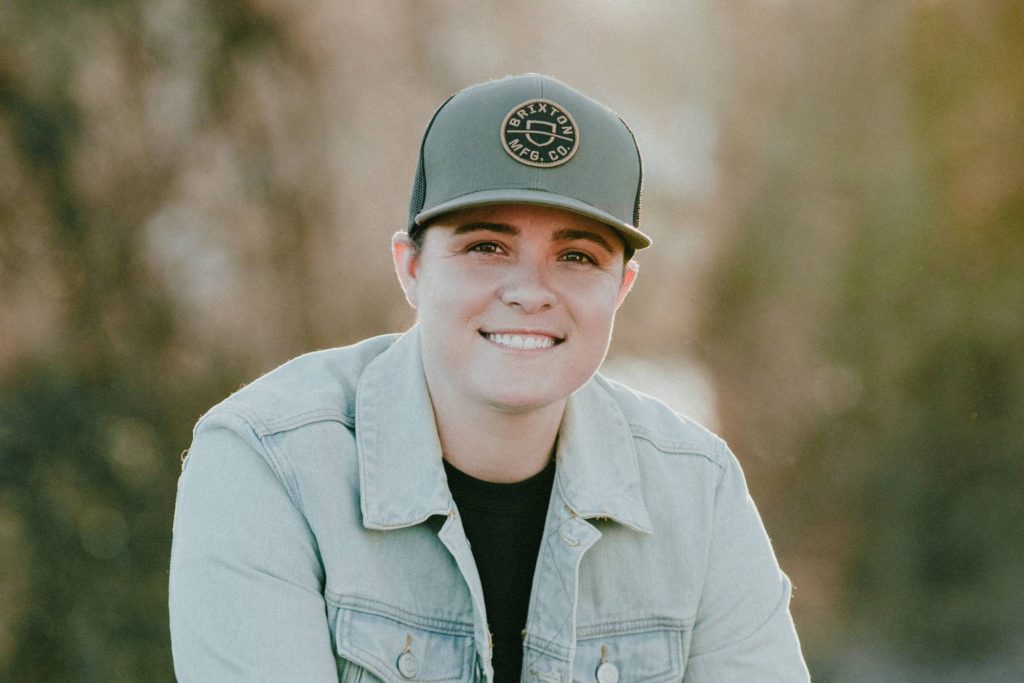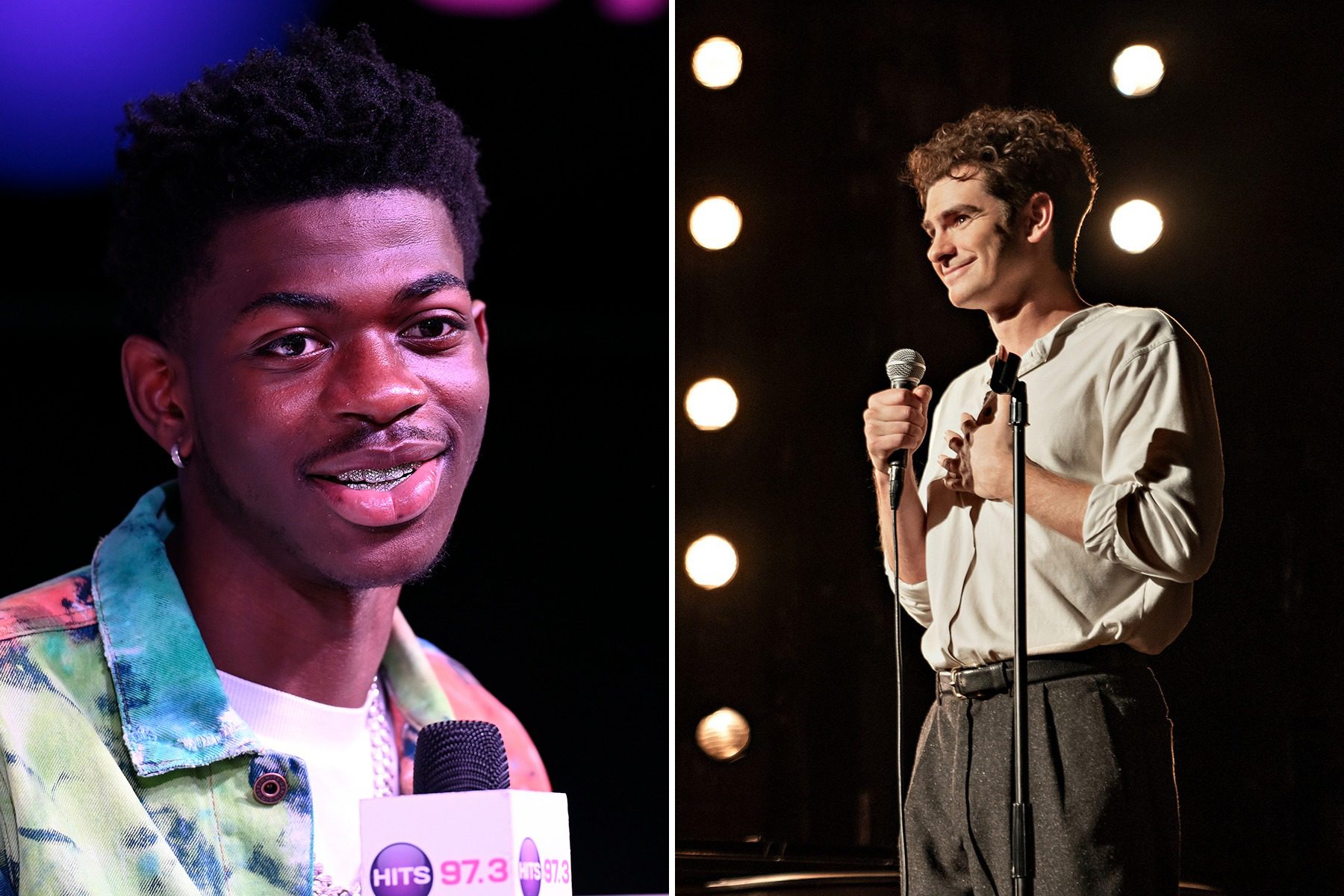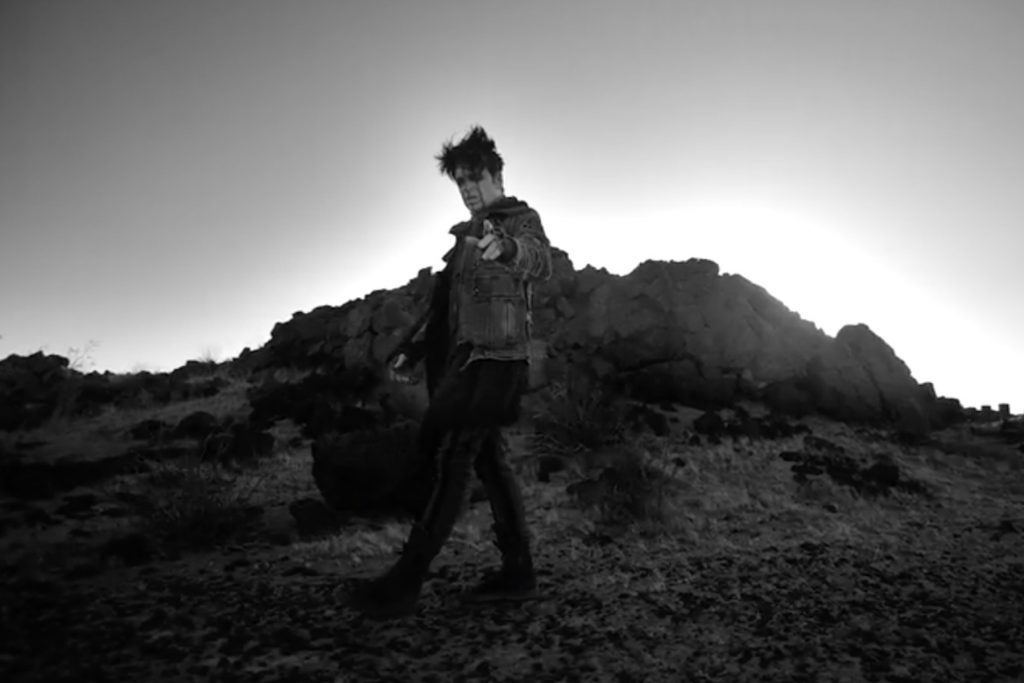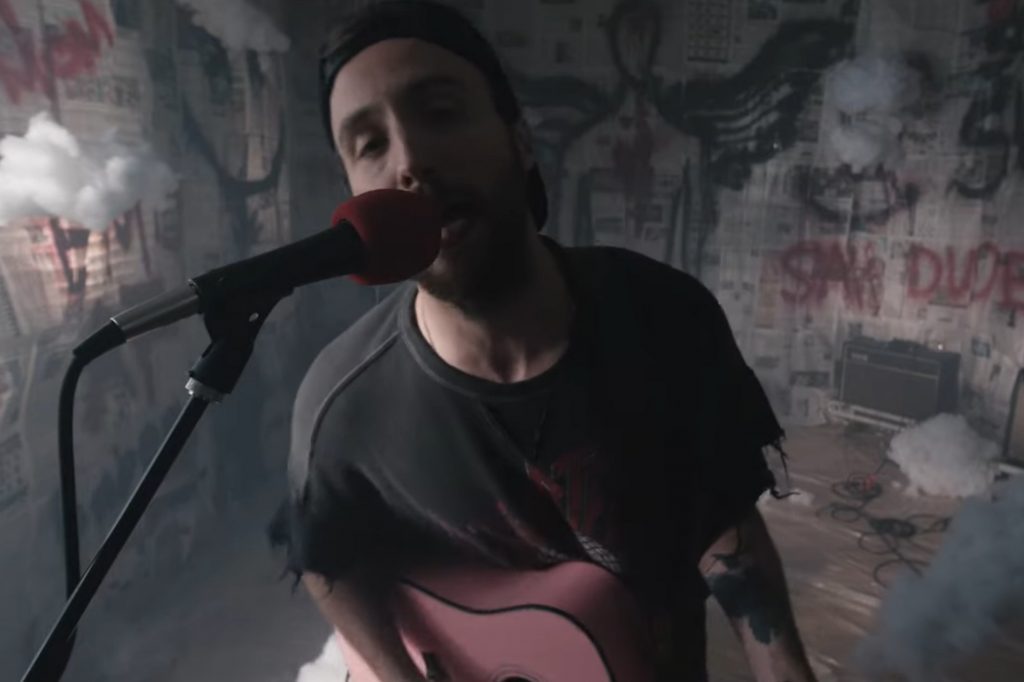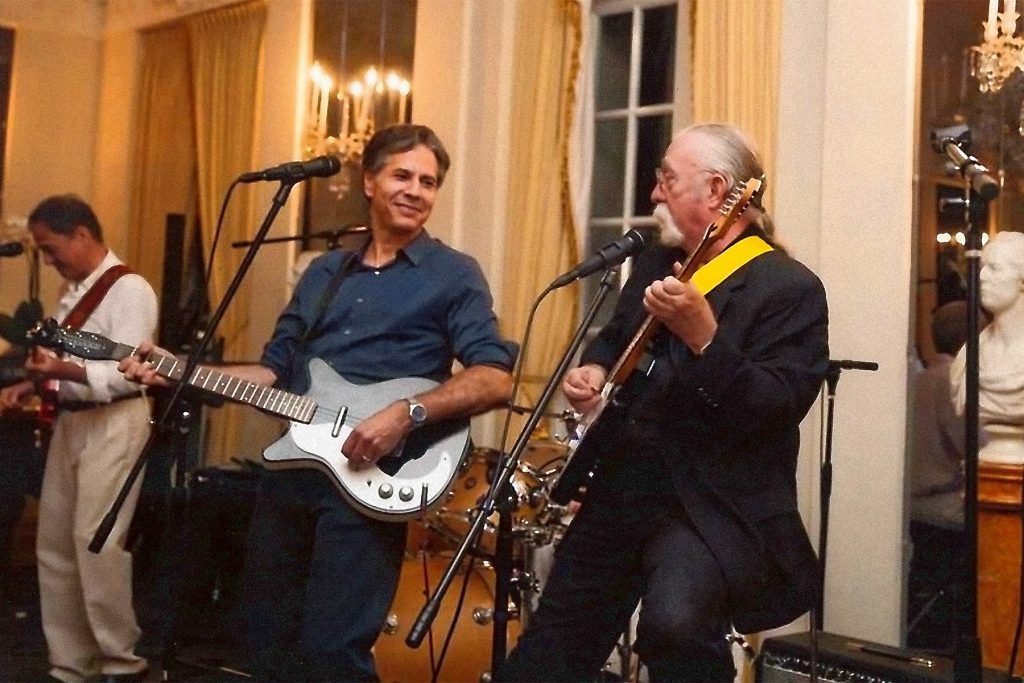
Antony Blinken’s Rock & Roll Heart
On the plane home from Jordan, Antony Blinken seems relieved to be talking about something other than his day job. In January, Blinken was sworn in as secretary of state under President Biden. When Blinken’s name surfaced as a nominee, his longtime passion for music made the headlines: It turns out he could play guitar reasonably well, wrote record reviews during his college days, and had penned his own songs (even making indie recordings of some of them, available on streaming services).
Shortly before the latest flare-up in the Israeli-Palestinian conflict, Blinken agreed to talk with IndieLand about his rock & roll jones. That crisis and other pressing issues delayed the conversation, but last week, Blinken finally found time to talk. “I tell you, it’s a pleasure to do,” he says about carving out time for such an unusual conversation. “And it’s a nice change of pace from, say, Middle East peace.”
Blinken has spent close to a lifetime prepping for his current job. His father, Donald Blinken, was U.S. ambassador to Hungary for four years during the Clinton administration. After graduating from Harvard and Columbia Law School, Blinken landed his first State Department job in the early Nineties, as a special assistant in the Bureau of European and Canadian Affairs. During the Clinton administration, he served as a foreign-policy speechwriter and member of the National Security Council staff. Under President Obama he was hired as a principal deputy national security advisor and then, between 2015 and 2017, as deputy secretary of state. Under then-VP Biden, Blinken served as national security advisor.
blogherads.adq.push(function () {
blogherads
.defineSlot( ‘medrec’, ‘gpt-dsk-tab-article-inbody1-uid0’ )
.setTargeting( ‘pos’, [“mid-article”,”mid”,”in-article1″,”mid-article1″] )
.setSubAdUnitPath(“music//article//inbody1”)
.addSize([[300,250],[620,350],[2,2],[3,3],[2,4],[4,2]])
;
});
But in addition to foreign policy, which he also explored as an author and during his post-college years as a researcher and writer at The New Republic, music has been the recurring thread in Blinken’s life. Like many members of his generation, Blinken fell in love with classic rock at an early age, covered songs by Pink Floyd and Lynyrd Skynyrd in school bands, and bought plenty of records (some by way of mail-order companies popular in the Seventies).
But Blinken, 59, is surely the only secretary of state whose applause may be heard on a Stones live album and, during his college days at the Harvard Crimson, reviewed Lou Reed’s The Blue Mask (“the work of a mature artist; the hostility and bitterness of the past that came to the fore on the successful Sally Can’t Dance have given way to passion and love with an ever-present undercurrent of anger”) and Bob Dylan’s Shot of Love (“the former Mr. Zimmerman has given us a valuable, if somewhat uneven, new piece for an ever-expanding puzzle”).
By his count, he owns “six or seven” guitars (“I’m left-handed, but somehow I’m not Jimi Hendrix,” he notes, dryly) and has done time as a guitarist in an ad-hoc group of government officials — a dad-rock jam band — called the Coalition of the Willing. Music, he says, “is just a driving passion in my life. And I continue to find joy in that, whether it’s playing a little or listening a lot.”
So does he bring an ax with him on diplomacy trips? “The thought has crossed my mind, except that it would really be unfair to my colleagues here,” he told IndieLand during the in-flight chat. “If I started playing, they really have no place to go if you’re on a plane, to get out of the way.”
You’re continuing a tradition of musician secretaries of state — Condoleezza Rice is a skilled classical pianist and John Kerry played in a Sixties garage band.
Condi is a much better pianist than I am a guitarist. And I never really got to hear John play guitar. So I can’t evaluate.
blogherads.adq.push(function () {
blogherads
.defineSlot( ‘medrec’, ‘gpt-dsk-tab-article-inbody2-uid1’ )
.setTargeting( ‘pos’, [“mid-article2″,”mid”,”in-article2″,”mid-article”] )
.setSubAdUnitPath(“music//article//inbody2”)
.addSize([[300,250],[300,251],[620,350],[2,4],[4,2],[3,3]])
.setLazyLoadMultiplier(2)
;
});
What’s the first album you owned or the first major band that got you into music?
I was thinking about what songs I remember that really struck me when I was really young. There was this Burt Bacharach song called “This Guy’s in Love with You.” Do you know that song?
The Herb Alpert version?
Exactly — that’s the one. That did it for me. I think I was probably nine or 10 years old, and somehow that really hit [laughs]. But I was a Beatles fanatic from probably as long as I can remember. Sgt. Pepper was the first album I actually owned, but I also had Magical Mystery Tour, Revolver, and Rubber Soul. It’s not exactly novel, but that’s been a lifelong passion from a pretty young age. I read the Hunter Davies authorized biography, and it turned out that “authorized” really meant something. [Chuckles] I recently read Mark Lewisohn’s first tome [Tune In], one of the most amazing books I’ve read on anything. So the Beatles have been the touchstone, I would say.
When I was an early teenager, there was a thing called Columbia House [a mail-order record club]. My best friend in school said, “Oh, you got to get this record.” And I ordered it. It was Eric Clapton at His Best, which really got me into his work. And that got me into a lot of the Chicago electric blues — Muddy Waters, Freddie and Albert and B.B. King, and guys who came later, like Otis Rush, Luther Allison, and Son Seals. But Clapton has also been the touchstone. I think I’ve seen him about 75 times in concert. I’m deep into that. He’s had an interesting career, shall we say.
Why Clapton?
If you go back to Derek and the Dominos’ Layla and Other Assorted Love Songs and listen to their cover of the blues song “Have You Ever Loved a Woman,” that is one of the greatest recordings ever made of anything. You listen to the trade-off between the vocal and the guitar fills in the intro, it’s unbelievable. And since Duane Allman is on that, there’s this amazing trade-off — two verses of a solo by Duane before it segues to Clapton. The Clapton solo at about four minutes and 12 seconds in — that’s how well I know it — is maybe the best thing ever. It still kills me every time I listen to it, 50 years later. And even for a guy who doesn’t have a reputation as the greatest singer, listen to the [Clapton] vocal on that on that track. As I say, it gets me every time. [Editor’s note: Blinken declined to comment on Clapton’s recent anti-lockdown and anti-virus remarks.]
blogherads.adq.push(function () {
blogherads
.defineSlot( ‘medrec’, ‘gpt-dsk-tab-inbodyX-uid2’ )
.setTargeting( ‘pos’, [“mid”,”mid-articleX”,”in-articleX”,”mid-article”] )
.setSubAdUnitPath(“music//article//inbodyX”)
.addSize([[300,250],[300,251],[3,3],[620,350]])
.setLazyLoadMultiplier(2)
;
});
Was Clapton your intro to learning guitar?
Yes, although I started when I was seven or eight and dropped it. Then, of course, I regretted dropping it, and I probably picked it up again when I was 16. All self-taught, which is evident if you hear me play. And I was in high school band and college bands and then later in “bands,” in quotation marks, where guys would get together and play occasionally and do some charity work.
You attended high school in Paris. Were you in a band there?
Yes, that’s where the first band was. It was incredibly eclectic because the lead guitar player was German and the drummer was French. There were a couple of Americans. We had the audacity to actually do a lot of originals. Not only did they not stand the test of time, I’m not sure they stood the test at the time. We played a lot of covers too. It all seems funny in retrospect, but we would do everything from “Jumpin’ Jack Flash” to “Walk on the Wild Side” to, I hate to say it, “Free Bird.” We did Pink Floyd’s “Another Brick in the Wall,” and my German friend nailed the David Gilmour solo.
How long did it take you to visit Jim Morrison’s grave when you were in Paris?
Pretty quick. You know, did that. But I would submit to you, I’m not the hugest Doors fan. But I made the pilgrimage as a matter of respect.
“The Clapton solo on ‘Have You Ever Loved a Woman’ at about four minutes and 12 seconds in — that’s how well I know it — is maybe the best thing ever.”
What was your first concert?
The first show I ever saw was when I was 14, the IndieLands in Paris [June 1976]. It was actually immortalized because the show I saw was part of the Love You Live record they put out.
In those days it was festival seating, so if you wanted to get a good seat, you had to turn up at the latest the morning of. My best friend and I went to the show, and we got there that morning. I don’t remember how we got the tickets. We were basically there all day. They open the doors at six or something. We got pretty good seats because we’d been there all day. Eight o’clock comes around and nothing. And 9:30, nothing. Finally, around 10 came the opening act, the Meters. They tore the house down and then they go off and then some comedian or juggler or some kind of act comes on. The Stones don’t go on until probably close to 11 and play for two and a half hours. By the time it’s done, it’s 1:30 in the morning and there’s no public transportation at that point in Paris and you can’t get a taxi. My pal and I walked home across the entire city. It was magical to experience a city in that way. And the Stones in terms of their performances were at a peak time. It was kind of unfair because, if that’s your first show, where do you go from there?
In college, at Harvard, you wrote record reviews for the Crimson, the student newspaper. You wrote about albums by Bob Dylan, the Who, Marshall Crenshaw and Lou Reed.
If you read some of those reviews today, it’s a little cringeworthy because the pretension sometimes wins out. But the thread that runs throughout my life is probably music, and that was another way of expressing it.
In your review of It’s Hard by the Who, from 1982, you wrote, “Not in a long while have the Who had so much to say and said it so impressively.” Do you still stand by that? Some may not agree.
I tell you, I still love “Eminence Front.” The groove on that song is incredible. But one classic does not a whole record make. I think in retrospect it’s not Who’s Next. I grant you that.
blogherads.adq.push(function () {
blogherads
.defineSlot( ‘medrec’, ‘gpt-dsk-tab-inbodyX-uid3’ )
.setTargeting( ‘pos’, [“mid”,”mid-articleX”,”in-articleX”,”mid-article”] )
.setSubAdUnitPath(“music//article//inbodyX”)
.addSize([[300,250],[300,251],[3,3],[620,350]])
.setLazyLoadMultiplier(2)
;
});
You were also pretty kind to Dylan’s Shot of Love, the last of his born-again records.
Like probably everyone else, I had a Dylan thing at some point, and I actually liked that record. It’s obviously not considered one of his crowning achievements, but there was a bunch of things in that rough period I like. I loved Street-Legal, which is also not considered necessarily the greatest. Infidels, the one with Mark Knopfler — that was a great record.
Have you kept up with Dylan’s work?
I have to be honest: I haven’t really kept up as much in recent years, so I tend to still listen to older things. And by the way, this goes back to my Clapton obsession: If you listen to the 30th anniversary Dylan concert, check out the [Clapton version of] “Don’t Think Twice, It’s All Right.” That’s pretty amazing too.
You’re said to have had musical encounters with two indie-rock legends, Alex Chilton and former Hüsker Dü drummer Grant Hart.
Over the years, I’ve been in “bands” with some of my closest pals who are Washingtonians. They’re called Cash Bar or Cash Bar Wedding. Eli Attie was Gore’s top speechwriter and then went on to be a writer and producer on The West Wing. Dave Segal is a reporter for The New York Times and, before that, The Washington Post. Dave McKenna was at the Washington City Paper and Deadspin. Jay Carney is the former White House press secretary. We were basically like the Beatles after they stopped touring. We never toured. We just went right to the recording studio. In the case of the Beatles, it was getting too loud with all the screaming girls and they couldn’t do justice to the recordings live. With us, it was because no one would actually pay to see us.
About once a year, we would find a town associated with music and rent a recording studio there. Because they were music journalists, Segal and McKenna knew a lot of people. We went to Minneapolis and somehow looked up Grant Hart, and he hung out with us and we went to the studio and played. That was phenomenal. When we went to New Orleans, we were ended up hanging with Chilton and went to his house. He had a home studio and we started to play a little. I’m not sure if it’s because he immediately realized how bad we were or what, but the playing kind of ended soon after. But he was an amazing guy. It was incredible to listen to him talk about obscure 16th-century German composers. That was also amazing especially for me, as a fan of Big Star, who are always on heavy rotation.
We also had a thrill of doing something with Aimee Mann. She actually humored us and came over to my apartment and all of us played for about two and a half hours. It’s probably one of the lowlights of her musical career, but certainly the highlight of mine.
blogherads.adq.push(function () {
blogherads
.defineSlot( ‘medrec’, ‘gpt-dsk-tab-inbodyX-uid4’ )
.setTargeting( ‘pos’, [“mid”,”mid-articleX”,”in-articleX”,”mid-article”] )
.setSubAdUnitPath(“music//article//inbodyX”)
.addSize([[300,250],[300,251],[3,3],[620,350]])
.setLazyLoadMultiplier(2)
;
});
Given your high-pressure job, what music do you put on to chill out?
I have stuff I go back to all the time: Clapton, the Beatles, McCartney and mid-to-late-Seventies Stevie Wonder. Talking Book is probably my favorite. I was just actually listening to it earlier today. There’s a song on it called “Tuesday Heartbreak,” which does it every time. If you go to the desert island, I’ve definitely got Layla and Other Assorted Love Songs and Talking Book.
I still love a lot of blues, R&B, and soul. Alicia Keys and, more recently, Leon Bridges. I love a lot of country — Steve Earle, Brad Paisley. And I love, love, love power pop: Marshall Crenshaw, Matthew Sweet, stuff like that. I like Bob Mould’s Sugar records a lot. Hüsker Dü actually played in my college gym [in 1984]. They opened for R.EM. My ears couldn’t actually hear the R.E.M. set because Hüsker Dü were so loud.
The incredible record I discovered really late, maybe five, six years ago, is a Graham Nash solo record, Songs for Beginners. This is the other wonderful thing: You just keep discovering stuff. The real problem is trying to stay current; that’s more of a challenge.
What new music have you heard recently?
I play everything just to make sure I have some idea, so I played the Olivia Rodrigo hit single “Drivers License” and I certainly played Taylor Swift. Something happened a few weeks ago that I never thought would happen: I liked it so much that I downloaded a Justin Bieber song, “Hallelujah.” I never thought that would happen to me. The guy I’ve been blown away by is Jack Antonoff, who writes and produces a lot of this stuff and has this band Bleachers. That guy is amazing. There’s a great song by Bleachers called “Don’t Take the Money.”
What did you think of “Drivers License”?
It’s really good. It’s a little bit odd, or surprising, because there are some folks, as she’s demonstrated, who have a natural gift. It’s just there. Not the case with me. I have to work at it. And even then. But at least I know enough to appreciate it.
“The guy I’ve been blown away by is Jack Antonoff. … That guy is amazing.”
If people go to Spotify, they’ll find three songs of yours, credited to “Ablinken”: the brooding rocker “Lip Service,” an acoustic singer-songwriter tune called “Patience,” and a modest funk-rocker called “Without Ya.” What’s the backstory there?
I had a bunch of songs I had written, probably 30 or 40 years ago, that were sitting around. I’d always had this ambition of giving them a somewhat proper recording. But I didn’t really have the chops and I didn’t have the recording skills to do that. But a good friend of mine is Lincoln Bloomfield, who also plays in this every-once-in-a-while charity band called Coalition of the Willing.
blogherads.adq.push(function () {
blogherads
.defineSlot( ‘medrec’, ‘gpt-dsk-tab-inbodyX-uid5’ )
.setTargeting( ‘pos’, [“mid”,”mid-articleX”,”in-articleX”,”mid-article”] )
.setSubAdUnitPath(“music//article//inbodyX”)
.addSize([[300,250],[300,251],[3,3],[620,350]])
.setLazyLoadMultiplier(2)
;
});
Here’s this wonderful bipartisan story. Lincoln was a senior official in the Reagan and Bush administrations and absolutely wonderful guy and a crazy, incredibly talented musician. He was in a Boston-area band in the Seventies that apparently had a little bit of local renown. He has a little recording studio at his home. We were doing some things with Coalition of the Willing and I was talking about some of these songs I had always wanted to record. He said, “Let’s do it,” so we did. That was just in the last three or four years. After the Obama administration ended, I had a little bit more time on my hands. Lincoln played bass, keyboards, and lead guitar. I’m on rhythm guitar and vocals.
What was it like to have the songs dissected in the press after you were nominated for secretary of state?
Oh, my God. You know, that was hard to describe, although I think there was one review that made some reference to it being very credible dad rock.
How do you feel about that term being applied to you?
I’ll take it. If anyone actually wants to listen, that’s great.
In terms of rockers associated with the previous administration, who was a better role model — Kid Rock or Ted Nugent?
I take Kid Rock, just in terms of the music. Nugent never really got me. But Kid Rock, I like a lot of what he did, especially some of the covers. They were good.
What do your musical tastes have in common with those of President Biden or Vice President Harris?
I think the one overlap I have with the president is Carole King. Like half the world, I probably wore out multiple copies of Tapestry. “Will You Love Me Tomorrow” also goes on the desert island. And I know he loves Carole King. When I was working for him in the Senate, one of the highlights was — and I can’t remember why — but somehow Carole King came by the office. He knew I love Carole King, so he made sure to bring me in. I’ve got this great photograph with her.
blogherads.adq.push(function () {
blogherads
.defineSlot( ‘medrec’, ‘gpt-dsk-tab-inbodyX-uid6’ )
.setTargeting( ‘pos’, [“mid”,”mid-articleX”,”in-articleX”,”mid-article”] )
.setSubAdUnitPath(“music//article//inbodyX”)
.addSize([[300,250],[300,251],[3,3],[620,350]])
.setLazyLoadMultiplier(2)
;
});
What have you listened to today?
Hold on. I’m getting my iPhone out. Aimee Mann, “Wise Up.” She’s one of the handful of great American songwriters of the last 25 years. Basically everything she’s written is great, but that song in particular I find particularly devastating. Then Maggie Rogers’ “Light On.” I have a real soft spot for just incredibly catchy and melodic choruses, and that song really nails it. Then Father John Misty, “Real Love Baby” — the melodies and the hooks grab you.
Then James Taylor’s “Line ‘Em Up” — not one of his famous songs, but it’s amazing. It’s about Nixon getting on the plane to leave after Watergate. Richard and Linda Thompson’s “Wall of Death.” That whole album [Shoot Out the Lights] is incredible. He’s the great underappreciated talent of our time as a guitar player and a writer. Then Bill Withers’ “Lovely Day.” There’s something about that where you hear it and you float. It’s this affirmation of life that I find incredibly powerful. And the last one is Alicia Keys’ “If I Ain’t Got You” — the emotion of the song, the vocal, the performance, the whole thing.
How much time do you have these days to practice guitar?
Not much. It stares at me. I feel very guilty.
Given your work with the Clinton and Biden administrations, you must have seen any number of musical performances at the White House or thereabouts.
That was one of the incredible treats of working at the White House, the artists who came through. I tried to try to find a way to go to pretty much every musical event. Beyoncé. A great Sara Bareilles evening. But a highlight was the Gershwin Prize, where prominent artists get an award every year. It culminates at a concert in the East Room of the White House, where other artists perform that person’s songs. Paul McCartney got the Gershwin Award in 2010. I was working for the vice president [Biden] then, and so was my friend Jay Carney, who is also a huge Beatles fan. We found out that McCartney was getting the prize, and my wife, Evan Ryan, who also worked for the vice president and had the right “ins,” went to Valerie Jarrett, who worked for the president [Obama], and said, “Look, Tony would never ask this, but I’m his wife, so I can ask for him. The only thing he’d ever want to do was go to this Paul McCartney evening.” And Valerie said, “Done — we’ll put him on the list.”
My wife finds out what time the doors are going to open, so Jay and I go there 10 or 15 minutes before. We’re literally the first people there. The East Room only has about 200 people. The doors are opened by the ushers, and we go in and sit ourselves down dead center in the third row. Everyone comes in: The president’s there in the front row with McCartney and his wife and family. And at one point President Obama turns around and sees me and Jay and gives us this look like, “What are you guys doing here?”
But the show was just incredible. It was everyone from Stevie Wonder to Dave Grohl to [chuckles] the Jonas Brothers performing McCartney songs. Elvis Costello did “Penny Lane,” and it was unbelievable because the French-horn solo was done by one of the uniform members of the president’s band. So that was probably the highlight. That was one to quit on.
You’re pretty much living the music-geek dream.
It’s a strange way to do it.
blogherads.adq.push(function () {
blogherads
.defineSlot( ‘medrec’, ‘gpt-dsk-tab-inbodyX-uid7’ )
.setTargeting( ‘pos’, [“mid”,”mid-articleX”,”in-articleX”,”mid-article”] )
.setSubAdUnitPath(“music//article//inbodyX”)
.addSize([[300,250],[300,251],[3,3],[620,350]])
.setLazyLoadMultiplier(2)
;
});
Can music unite people of different ideologies? There’s a clip on the internet of you, your pals, and the more conservative-inclined Jeff “Skunk” Baxter playing “Hoochie Coochie Man” in the White House.
The other “band” I’ve played with, Coalition of the Willing, is a bunch of Washington wonks. It includes Linc Bloomfield, Andras Simonyi, the [former] Hungarian ambassador to Washington, and Dan Poneman, the deputy secretary of energy under Obama. The group also had Dan McDermott and Jeff “Skunk” Baxter, famously of Steely Dan and the Doobie Brothers. I don’t know if you know this, but Skunk Baxter has been a consultant to the Defense Department for 25 years. Guitars for Steely Dan and the Doobie Brothers by day, Defense Department consultant by night.
He’s also known to lean right.
I don’t know if he’s a Republican or a Libertarian, but he’s a missile-defense geek. He’s just an incredibly nice, lovely guy who basically humored us and then played with us for charity gigs. It was just surreal to be in proximity to someone like Skunk Baxter on the same, very, very small stage.
There’s a line in your song “Without Ya”: “Waiting for a change of heart/Can we make a brand new start?” Is that a line you could apply to your diplomatic efforts?
[Laughs] Ha! If I have to apply my music to my job, we’re really in trouble. Hopefully not.
